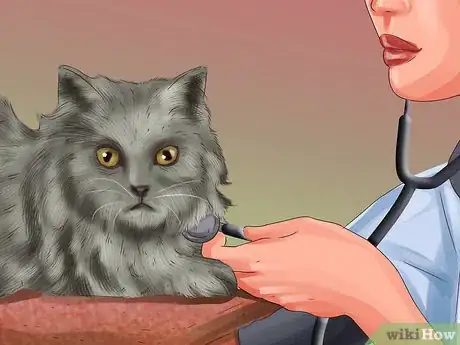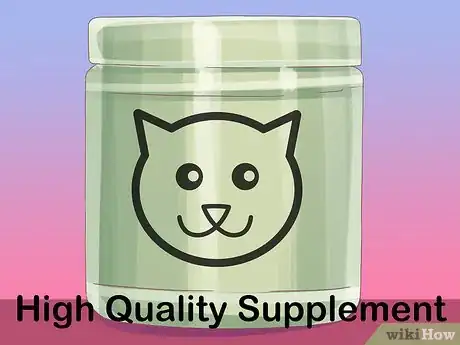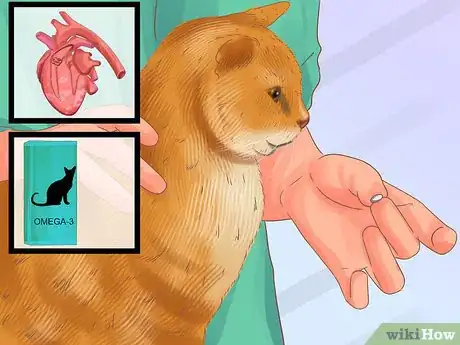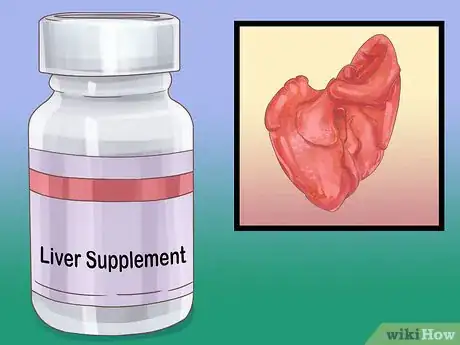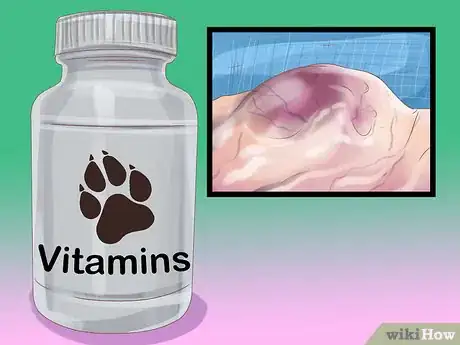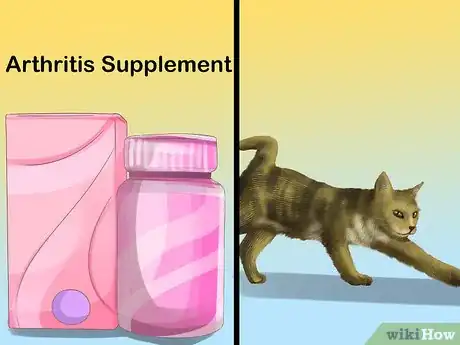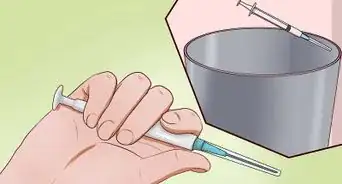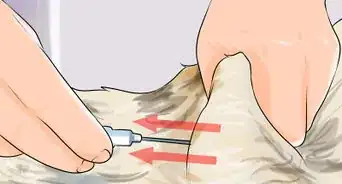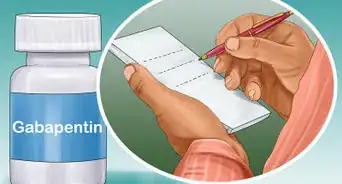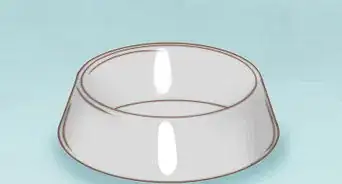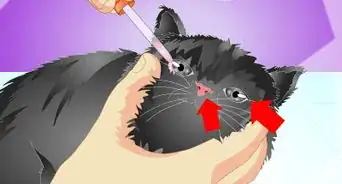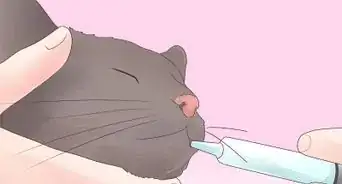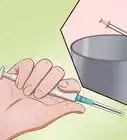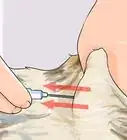This article was co-authored by Ryan Corrigan, LVT, VTS-EVN. Ryan Corrigan is a Licensed Veterinary Technician in California. She received her Bachelor of Science in Veterinary Technology from Purdue University in 2010. She is also a Member of the Academy of Equine Veterinary Nursing Technicians since 2011.
This article has been viewed 18,362 times.
High-quality cat foods are formulated to meet all of a cat's basic nutritional needs.[1] However, you may choose to give your cat nutritional supplements if you think that its health needs additional support. Supplements for cats can be especially helpful for those that are having severe health problems, such as kidney failure or heart disease. In order to figure out what supplements are right for your cat, you should first have your cat's health assessed by its veterinarian. Then you can discuss with the vet what supplements might be right for your particular cat.
Steps
Assessing Your Cat's Need for Supplements
-
1Assess your cat's health. If you are considering giving your cat nutritional supplements, it is important for you to understand your cat's overall health. This assessment should be done by a veterinarian. Having an overall assessment will allow you to make decisions about what supplements the cat does, and does not, need.
- A good time to get a thorough understanding of your cat's overall health is during their annual veterinary exam.
-
2Discuss supplements with your veterinarian. If you are considering giving your cat supplements you should discuss it with your veterinarian. The cat's veterinarian should have a good understanding of your cat's health and they should have the veterinary knowledge to explain what certain supplements would, and wouldn't, do to your cat's health.
- Your veterinarian will likely caution you to not over do it with supplements. While it is important that your cat gets all the necessary vitamins and minerals it needs to stay healthy, giving it too many vitamins and minerals can hurt its health as well.
Advertisement -
3Buy high-quality supplements. If your veterinarian does agree that your cat may benefit from taking supplements, you should be sure to buy quality products. These may be available through your veterinary office but you may have to go elsewhere to purchase them.
- Buy the supplements from your vet if possible so you know you're getting a safe, quality product.
- Many pet stores will stock supplements for pets and you can buy them online. However, if buying supplements somewhere other than your veterinary office, be sure to read all the ingredients so that you are not giving your cat more ingredients than it actually needs.
-
4Give supplements as directed. As with all medications and supplements, it is important that you follow the directions on the packaging provided or follow your veterinarian's suggestions for dosage. This will help you assure that your cat gets a therapeutic dose of the supplements you want to give it.
- Supplements can be given to your cat in a variety of ways. Some supplements are given in pill form but most are given in forms that are easier to give to a cat, such as oils or powders that are put on food. For example, supplementing your cat's diet with fish oil simply requires that you put the oil on the cat's food.[2]
- There is not much existing data about safe use of supplements in cats. In order to safeguard your cat, discuss supplement dosing with your veterinarian before giving supplements to your cat.[3]
Giving Supplements to Help With Health Problems
-
1Give supplements to a cat with heart disease. There are some nutritional supplements that can be given to cats with heart disease that can improve their health. These include omega-3 fatty acids, which are usually given to cats in the form of fish oil.[4]
- You can buy fish oil at any natural food store or pharmacy. However, the quality of these products will vary and dosing information for a cat will not be supplied. In this case, you should look at the label to make sure the product is pure and you should discuss dosing with your veterinarian.
-
2Give supplements to a cat with liver disease. If your cat has liver disease, you should discuss the possible benefits that supplements might provide for its health with your veterinarian. For example, antioxidants might be beneficial because they can help protect liver cells.[5]
- Some other supplements that might be helpful include Vitamin E, Vitamin C, S-adenosyl-methionine, and milk thistle. Discuss the use of these supplements with your veterinarian before giving them to your cat.
-
3Increase your cat's vitamin intake if it has renal failure. Renal failure, also known as kidney disease, can cause your cat to lose a large amount of vitamins. This is because excess urination draws water-soluble vitamins out of the body. In order to counteract this problem, your veterinarian may suggest supplementing your cat's vitamin intake of vitamins B and C. This can be done with vitamin supplements or by switching the kind of food that it eats.
- In most cases, your cat's vitamin intake can be increased most easily by changing the food it eats. Most cat foods that are made specifically for cats with renal failure have increased amounts of vitamin B and C in them.[6]
-
4Supplement your cat's diet if it has arthritis. If your cat is aging and has developed arthritis, it is a good idea to discuss the supplements that might help its agility with your veterinarian. In many cases, the veterinarian will suggest supplementing the cat's diet with glucosamine and chondroitin.[7]
- While these supplements will not get rid of arthritis completely, they can help to improve joint function.
Warnings
- If you give your cat a multi-vitamin, you run the risk of creating a toxic level of certain vitamins in its system. This can occur because most cat foods provide a sufficient amount of all necessary vitamins, so giving your cat a multi-vitamin in addition to its diet can lead to an excess of vitamins.[8]⧼thumbs_response⧽
References
- ↑ http://vetmed.tamu.edu/news/pet-talk/the-importance-of-supplements-for-your-pets
- ↑ https://vet.tufts.edu/heartsmart/diet/important-nutrients-for-pets-with-heart-disease/
- ↑ http://dels.nas.edu/resources/static-assets/materials-based-on-reports/reports-in-brief/satety_of_dietary_supplements_final.pdf
- ↑ https://vet.tufts.edu/heartsmart/diet/important-nutrients-for-pets-with-heart-disease/
- ↑ http://www.vetmed.ucdavis.edu/vmth/small_animal/nutrition/client_info_sheets/encephalopathy.cfm
- ↑ http://www.vetmed.ucdavis.edu/vmth/small_animal/nutrition/client_info_sheets/chronic_renal_disease.cfm
- ↑ http://www.petmd.com/cat/centers/nutrition/evr_ct_cats-really-need-nutritional-supplements
- ↑ http://www.petmd.com/cat/centers/nutrition/evr_ct_cats-really-need-nutritional-supplements
About This Article
Before giving your cat a nutritional supplement, discuss your pet’s overall health with your veterinarian so you know what supplement it needs. For example, if your cat has heart disease, give it fish oil, which contains heart-healthy omega-3 fatty acids. If possible, buy your supplements from your vet so you know that you’re getting a quality product. Alternatively, buy your cat's supplements from a pet store, but make sure to read all of the ingredients so you know you're getting a high quality product without fillers. For more tips from our Veterinary co-author, including how to give your cat its supplement, keep reading!
